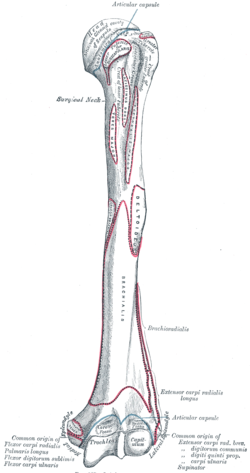Bicipital groove
| Bicipital | |
|---|---|
 Left humerus. Anterior view. (Intertubercular groove visible at top.) | |
 intertubercular groove, upper left. | |
| Details | |
| Identifiers | |
| Latin | sulcus intertubercularis |
| TA98 | A02.4.04.007 |
| TA2 | 1186 |
| FMA | 23396 |
| Anatomical terms of bone | |
The bicipital groove (intertubercular groove, sulcus intertubercularis) is a deep groove on the humerus that separates the greater tubercle from the lesser tubercle. It allows for the long tendon of the biceps brachii muscle to pass.
Structure
[edit]The bicipital groove separates the greater tubercle from the lesser tubercle.[1] It is usually around 8 cm long and 1 cm wide in adults.[1] It lodges the long tendon of the biceps brachii muscle between the tendon of the pectoralis major muscle on the lateral lip and the tendon of the teres major muscle on the medial lip. It also transmits a branch of the anterior humeral circumflex artery to the shoulder joint.[citation needed]
The insertion of the latissimus dorsi muscle is found along the floor of the bicipital groove. The teres major muscle inserts on the medial lip of the groove.[citation needed]
It runs obliquely downward, and ends near the junction of the upper with the middle third of the bone. It is the lateral wall of the axilla.[2]
Function
[edit]The bicipital groove allows for the long tendon of the biceps brachii muscle to pass.[1]
Gallery
[edit]

See also
[edit]References
[edit]![]() This article incorporates text in the public domain from page 209 of the 20th edition of Gray's Anatomy (1918)
This article incorporates text in the public domain from page 209 of the 20th edition of Gray's Anatomy (1918)
- ^ a b c Wafae, Nader; Atencio Santamaría, Luciany Everardo; Vitor, Leonardo; Pereira, Luiz Antonio; Ruiz, Cristiane Regina; Wafae, Gabriela Cavallini (2010-01-01). "Morphometry of the human bicipital groove (sulcus intertubercularis)". Journal of Shoulder and Elbow Surgery. 19 (1): 65–68. doi:10.1016/j.jse.2009.05.005. ISSN 1058-2746. PMID 19574066.
- ^ "Dissector Answers - Axilla and Arm". Archived from the original on 2007-12-10. Retrieved 2007-12-23.
External links
[edit]- Anatomy photo:03:st-0204 at the SUNY Downstate Medical Center
